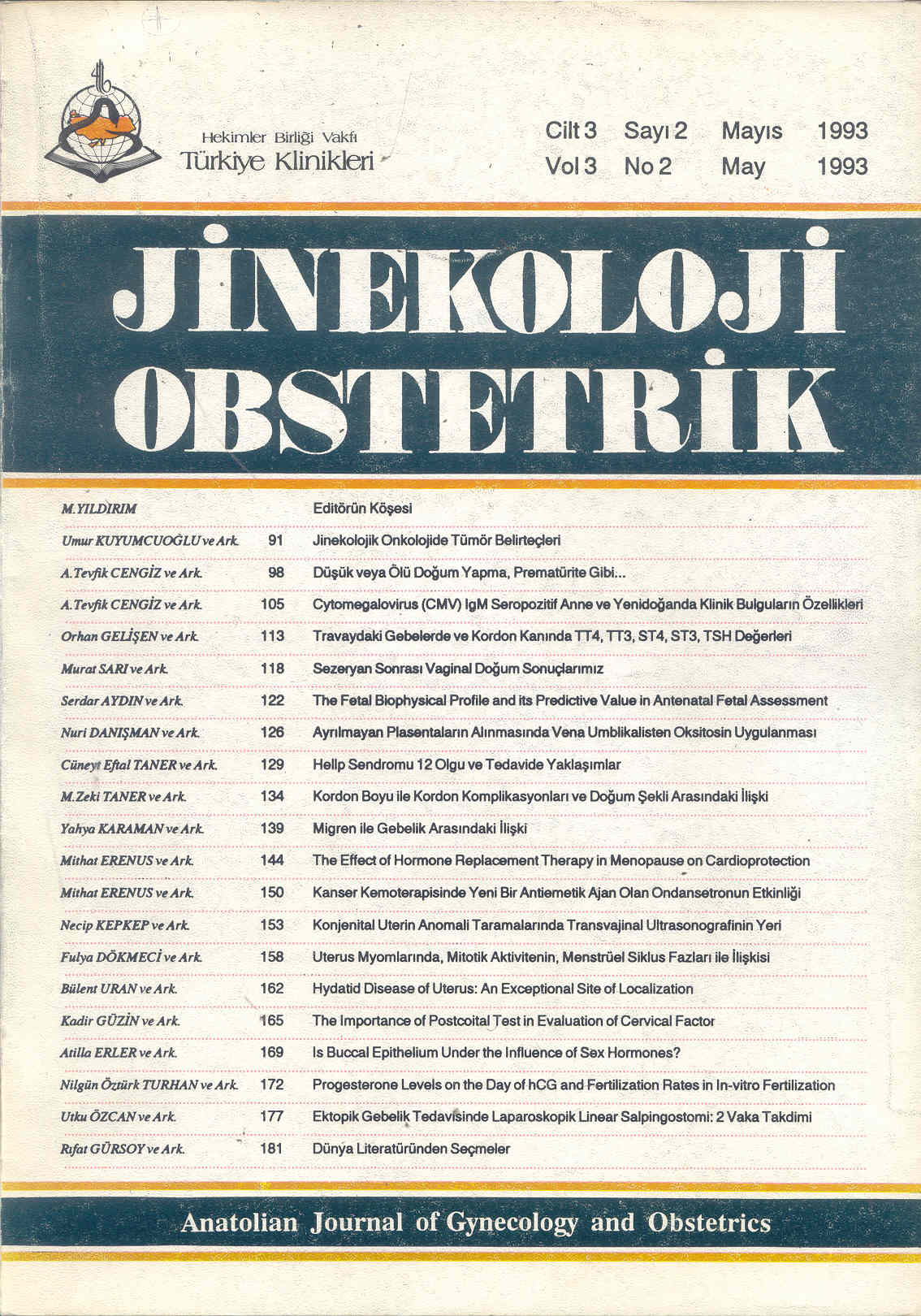Open Access
Peer Reviewed
ARTICLES
3021 Viewed1027 Downloaded
The Effect of Hormone Replacement Therapy in Menopause on Cardioprotection
Postmenopozal Hormon Replasman Tedavisinin Kardiyoprotektif Etkileri
Turkiye Klinikleri J Gynecol Obst. 1993;3(2):144-9
Article Language: TR
Copyright Ⓒ 2025 by Türkiye Klinikleri. This is an open access article under the CC BY-NC-ND license (http://creativecommons.org/licenses/by-nc-nd/4.0/)
ÖZET
Kardiovasküler hastalıklar kadınlarda en önde gelen ölüm nedenidir ve menopoz sonrası insidansta hızlı bir artış gözlenmektedir ve östrojenin kardiovasküler hastalıklar açısından profilaksi oluşturduğu düşünülmektedir. Koruyucu etkinin kan kolesterol düzeylerinde oluşan olumlu değişiklikler sonucu ortaya çıktığına inanılmaktadır. Östrojen düşük dansiteli lipoproteinleri azaltırken yüksek dansiteli lipoprotein düzeylerinin artmasına neden olur. Diğer bir muhtemel mekanizma da östrojen hormonunun arteryel intima üzerindeki direkt etkisidir. Hormon replasman tedavisinde kullanılan östrojenin tipi ve uygulama yolu kardiovasküler sistem üzerindeki olumlu ve olumsuz etkileri belirler. Pekçok çalışmayla postmenopozal östrojen uygulamasının kardiovasküler hastalık ve buna bağlı mortalitede %50 ya da daha fazla azalma sağladığı gösterilmiştir. Östrojen replasman tedavisine progesteron eklenmesini östrojenin kolesterol üzerindeki faydalı etkilerini zayıflatabilir. Yine de düşük dozlarda kullanılan progesteron kardiovasküler sistem üzerinde olumsuz etkiler göstermeyebilir.
Kardiovasküler hastalıklar kadınlarda en önde gelen ölüm nedenidir ve menopoz sonrası insidansta hızlı bir artış gözlenmektedir ve östrojenin kardiovasküler hastalıklar açısından profilaksi oluşturduğu düşünülmektedir. Koruyucu etkinin kan kolesterol düzeylerinde oluşan olumlu değişiklikler sonucu ortaya çıktığına inanılmaktadır. Östrojen düşük dansiteli lipoproteinleri azaltırken yüksek dansiteli lipoprotein düzeylerinin artmasına neden olur. Diğer bir muhtemel mekanizma da östrojen hormonunun arteryel intima üzerindeki direkt etkisidir. Hormon replasman tedavisinde kullanılan östrojenin tipi ve uygulama yolu kardiovasküler sistem üzerindeki olumlu ve olumsuz etkileri belirler. Pekçok çalışmayla postmenopozal östrojen uygulamasının kardiovasküler hastalık ve buna bağlı mortalitede %50 ya da daha fazla azalma sağladığı gösterilmiştir. Östrojen replasman tedavisine progesteron eklenmesini östrojenin kolesterol üzerindeki faydalı etkilerini zayıflatabilir. Yine de düşük dozlarda kullanılan progesteron kardiovasküler sistem üzerinde olumsuz etkiler göstermeyebilir.
ANAHTAR KELİMELER: Östrojen, kardiovasküler hastalık
ABSTRACT
Cardiovascular disease (CVD) is the leading cause of death women, and after menopause the incidence increases rapidly. The premenopausal state and estrogen status, appear to be a prophylactic against the mortality risk from CVD. The protective effect is believed to be mediated by beneficial changes in cholesterol levels. Estrogen decreases low density lipoprotein cholesterol (LDL-C) and increases high density lipoprotein cholesterol (HDL-C). The other possible mechanism is the direct effect of estrogen on arterial intima. The type and route of estrogen used in hormone replacement therapy determines the positive and negative effect of estrogen on the cardiovascular system. Most studies show a 50% or greater reduction in CVD and related mortality with postmenopausal estrogen administration. Progestogen addition to hormone replacement, may attenuate the beneficial effects of estrogen on cholesterol. However if used in low doses progesteron may not exert this negative effect on the cardiovascular system.
Cardiovascular disease (CVD) is the leading cause of death women, and after menopause the incidence increases rapidly. The premenopausal state and estrogen status, appear to be a prophylactic against the mortality risk from CVD. The protective effect is believed to be mediated by beneficial changes in cholesterol levels. Estrogen decreases low density lipoprotein cholesterol (LDL-C) and increases high density lipoprotein cholesterol (HDL-C). The other possible mechanism is the direct effect of estrogen on arterial intima. The type and route of estrogen used in hormone replacement therapy determines the positive and negative effect of estrogen on the cardiovascular system. Most studies show a 50% or greater reduction in CVD and related mortality with postmenopausal estrogen administration. Progestogen addition to hormone replacement, may attenuate the beneficial effects of estrogen on cholesterol. However if used in low doses progesteron may not exert this negative effect on the cardiovascular system.
MENU
POPULAR ARTICLES
MOST DOWNLOADED ARTICLES





This journal is licensed under a Creative Commons Attribution-NonCommercial-NoDerivatives 4.0 International License.










